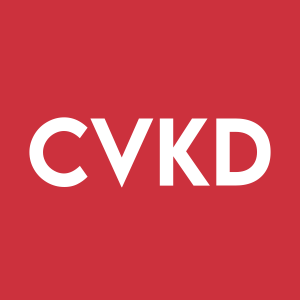Published Findings Highlight Tecarfarin's Potential and Reinforce Need for Better Anticoagulation Therapy in LVAD Patients
Rhea-AI Summary
Cadrenal Therapeutics (Nasdaq: CVKD) highlighted a recently published manuscript in the Journal of Cardiac Failure, evaluating the relationship between time in therapeutic range (TTR) management quality and clinical outcomes for left ventricular assist device (LVAD) patients. The findings emphasize the need for improved anticoagulation therapy beyond warfarin to reduce gastrointestinal bleeding, a common complication in LVAD patients.
Key points:
- Tecarfarin, a novel vitamin K antagonist (VKA), may offer more stable and effective anticoagulation for LVAD patients
- A secondary analysis of the ARIES-HM3 trial showed a 47% reduction in bleeding risk for patients with a TTR above the median
- Lower TTRs were associated with threefold more sub-therapeutic INRs than supra-therapeutic INRs
- Cadrenal Therapeutics is developing tecarfarin as a late-stage, next-generation VKA oral and reversible anticoagulant
Positive
- Tecarfarin shows potential to address unmet anticoagulation needs in LVAD patients more effectively
- Published findings support the development of tecarfarin as a next-generation VKA
- Secondary analysis of ARIES-HM3 trial showed 47% reduction in bleeding risk for patients with higher TTR
Negative
- Current anticoagulation therapy with warfarin leads to persistent gastrointestinal bleeding in LVAD patients
- Median TTR for VKAs in ARIES-HM3 trial was only 56%, indicating suboptimal anticoagulation management
News Market Reaction 1 Alert
On the day this news was published, CVKD gained 19.12%, reflecting a significant positive market reaction.
Data tracked by StockTitan Argus on the day of publication.
- Analysis features the growing need to evolve anticoagulation therapy beyond warfarin to avoid gastrointestinal bleeding, a significant and common complication for left ventricular assist device (LVAD) patients resulting in expensive hospitalizations
- Tecarfarin, a novel vitamin K antagonist (VKA), uses a different metabolic pathway than warfarin, the most commonly used anticoagulant for LVAD patients, and may offer more stable and effective anticoagulation
In the manuscript co-authored by Mandeep R. Mehra, MD, MSc, FRCP, Brigham and Women's Hospital Heart and Vascular Center, Center for Advanced Heart Disease, titled "Antithrombotic Strategies with Left Ventricular Devices," the findings conclude that although the current generation of LVAD pumps has largely overcome hemocompatibility-related adverse events there is a continuing need to evolve the anticoagulant therapy to avoid persistent gastrointestinal bleeding, which leads to frequent hospital admissions, procedures, blood transfusions, decreased quality of life and increased cost of care.1
Dr. Mandeep Mehra, who chaired the ARIES-HM3 study, commented, "Tecarfarin could potentially be an important therapy for patients with LVADs who all require chronic anticoagulation since it does not get affected by drug-drug interactions or changes in kidney function like warfarin and deserves further study."
A secondary analysis of the ARIES-HM3 trial, sponsored by Abbott, evaluated the relationship between VKA management quality and clinical outcomes, wherein a median TTR for VKAs of
"These findings provide us with increased confidence that tecarfarin has the potential to address the LVAD patients' critical unmet anticoagulation needs more effectively," said Quang X. Pham, Chairman and Chief Executive Officer of Cadrenal Therapeutics. "We are excited to work with the LVAD community to potentially bring our next-generation VKA to patients."
About Tecarfarin
Tecarfarin is the only oral anticoagulant in development worldwide for patients with implanted cardiac devices and other rare cardiovascular conditions. It has been uniquely designed to overcome many of the challenges patients experience with warfarin. Tecarfarin is metabolized using carboxyl esterase rather than the cytochrome P450 system, which allows the drug to avoid interactions with many other commonly used medications and may offer more stable anticoagulation, including those patients with renal dysfunction, which is common in LVAD patients. In a Phase II study with 66 patients with atrial fibrillation switched from warfarin to tecarfarin, the mean interpolated TTR was
In addition, tecarfarin may prove valuable for other patients where warfarin is not providing recommended anticoagulation because of genetic warfarin resistance or renal impairment making warfarin metabolism difficult. These include individuals with end-stage kidney disease and atrial fibrillation or those with mechanical heart valves and hard-to-control International Normalized Ratio, which measures how long it takes the blood to clot.
On August 6, 2024, Cadrenal Therapeutics announced that it had been in discussions with Abbott about Cadrenal's planned pivotal study of tecarfarin in patients with recently implanted LVADs. LVAD patients require lifelong anticoagulation to protect against thromboembolic events. The only LVAD available in the
On April 9, 2024, Cadrenal Therapeutics announced that the
About Cadrenal Therapeutics, Inc.
Cadrenal Therapeutics Is Developing Tecarfarin for unmet needs in anticoagulation therapy. Tecarfarin is a late-stage novel oral and reversible anticoagulant (blood thinner) to prevent heart attacks, strokes, and deaths due to blood clots in patients with implanted cardiac devices and those with rare cardiovascular conditions. Tecarfarin has an orphan drug designation for the prevention of thrombosis and thromboembolism in patients with ventricular assist devices (VADs). Tecarfarin also has orphan drug and fast-track designations from the FDA for the prevention of systemic thromboembolism (blood clots) of cardiac origin in patients with end-stage kidney disease and atrial fibrillation. Cadrenal is also pursuing additional regulatory strategies for unmet needs in anticoagulation therapy for patients with thrombotic antiphospholipid syndrome. Tecarfarin is specifically designed to leverage a different metabolism pathway than the oldest and most commonly prescribed Vitamin K Antagonist (warfarin). Tecarfarin has been evaluated in 11 human clinical trials and more than 1,000 individuals. In Phase 1, Phase 2, and Phase 2/3 clinical trials, tecarfarin has generally been well-tolerated in both healthy adult subjects and patients with chronic kidney disease. For more information, please visit: www.cadrenal.com.
Safe Harbor Statement
Any statements in this press release about future expectations, plans, and prospects, as well as any other statements regarding matters that are not historical facts, may constitute "forward-looking statements." These statements include statements regarding tecarfarin offering more stable and effective anticoagulation than warfarin, the potential role of investigating new VKA agents beyond warfarin in improving clinical outcomes in LVAD patients, the continuing need to evolve the anticoagulant therapy to avoid persistent gastrointestinal bleeding and tecarfarin potentially being an important therapy for patients with LVADs who all require chronic anticoagulation since it does not get affected by drug-drug interactions or changes in kidney function like warfarin, tecarfarin having the potential to address the LVAD patients' critical unmet anticoagulation needs more effectively and potentially bringing the Company's r next-generation VKA to patients The words "anticipate," "believe," "continue," "could," "estimate," "expect," "intend," "may," "plan," "potential," "predict," "project," "should," "target," "will," "would" and similar expressions are intended to identify forward-looking statements, although not all forward-looking statements contain these identifying words. Actual results may differ materially from those indicated by such forward-looking statements as a result of various important factors, including the ability of tecarfarin to improve anticoagulation treatment in patients, the ability of the Company to advance tecarfarin with patients with left ventricular assist devices (LVADs), and the other risk factors described in the Company's Annual Report on Form 10-K for the year ended December 31, 2023, and the Company's subsequent filings with the SEC, including subsequent periodic reports on Quarterly Reports on Form 10-Q and Current Reports on Form 8-K. Any forward-looking statements contained in this press release speak only as of the date hereof and, except as required by federal securities laws, the Company specifically disclaims any obligation to update any forward-looking statement, whether as a result of new information, future events, or otherwise.
For more information, please contact:
Cadrenal Therapeutics:
Matthew Szot, CFO
858-337-0766
press@cadrenal.com
Investors:
Lytham Partners, LLC
Robert Blum, Managing Partner
602-889-9700
CVKD@lythampartners.com
![]() View original content to download multimedia:https://www.prnewswire.com/news-releases/published-findings-highlight-tecarfarins-potential-and-reinforce-need-for-better-anticoagulation-therapy-in-lvad-patients-302225967.html
View original content to download multimedia:https://www.prnewswire.com/news-releases/published-findings-highlight-tecarfarins-potential-and-reinforce-need-for-better-anticoagulation-therapy-in-lvad-patients-302225967.html
SOURCE Cadrenal Therapeutics, Inc.








